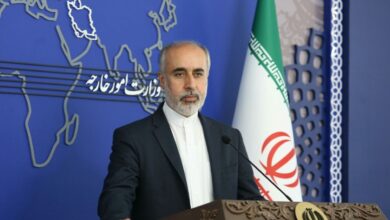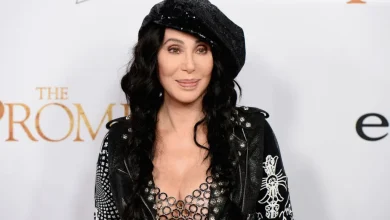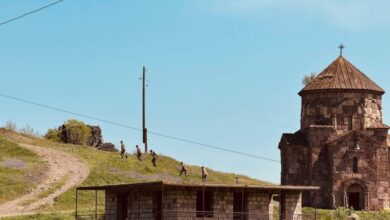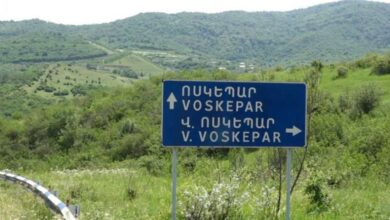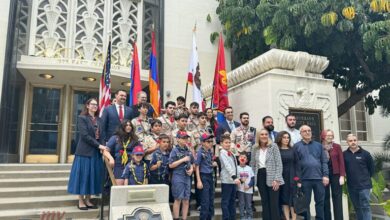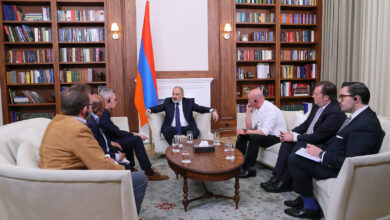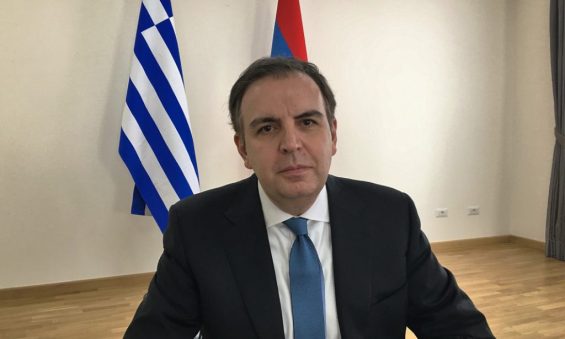
“I am sure we can identify untapped areas in the trade and economic fields in order to eliminate the disproportion, or asymmetry, as minister Kotzias said, between our political relations and economic dialogue”, stated Armenian Deputy Minister of Foreign Affairs Garen Nazarian during an interview with the Independent Balkan News Agency. The Deputy Minister highlighted the fact that “interstate relations between Armenia and Greece are based on historical bonds of friendship” between the two nations and added that “there is a vibrant Armenian community in Greece effectively integrated into the social, economic and political life of the country”. Finally as far as relations with Turkey and Azerbaijan are concerned Nazarian made it clear that the closing of the border by the Turkish side “has to be revised”.
Read the full interview
Greece and Armenia are connected through a centuries old friendship and have always cooperated at multiple levels. Which areas of cooperation do you consider important for the further development of these relations and what do you plan to do? Mr. Kotzias spoke of three asymmetries that need to be addressed.
First of all I would like to warmly welcome minister Kotzias and his delegation. This is his first visit to Yerevan and we will use the opportunity to have substantial discussions aimed at expanding our bilateral relations in all possible areas. The interstate relations between Armenia and Greece are based on historical bonds of friendship between our nations and we share a lot of commonalities.
During the meeting ministers rightly highlighted the asymmetric issues and we need to pay more attention to that aspect and in particular the full implementation of previously agreed commitments, including those that are entrenched in our legal framework. The latter will also need a further assessment; and we will start working on that immediately, to identify the potential areas for a beneficial cooperation.
We are fortunate to have an extensive political dialogue between our friendly governments. High-level reciprocal visits are taking place on both sides. In 2014 the President of Greece was in Armenia, in 2016 the President of Armenia visited Greece. We have regular meetings and exchanges between our foreign and defence ministers and these are the best opportunities to exchange views on priority issues of bilateral, regional and international concern.
More meetings are planned for today between our Foreign Ministers and later on, with the President of Armenia Serzh Sargsyan and we look forward to the outcome of these meetings. I am sure we can identify untapped areas especially in the trade and economic fields in order to eliminate the disproportion, or asymmetry, as minister Kotzias said, between our political relations and economic dialogue.
Potential areas of expanding the sectoral cooperation would be tourism, which is already happening. As you know, the number of Armenians who are visiting Greece increased last year more than three times. We also expect Greeks visiting Armenia. We welcome the resumption of regular direct and charter flights between our countries. Strong cultural interconnections, along with the exchanges in the fields of education and science can also form solid grounds for future cooperation. And of course trade and investment issues will be on our special focus. We have been tasked to start the preparation of the business forum by the end of this year and this will require careful and targeted steps on both sides.
What about the visa liberalisation for Armenian citizens? Can this occur soon or is it difficult?
Visa liberalisation dialogue for the citizens of Armenia has been referred to in the joint declaration of the Riga Summit of the Eastern Partnership in 2015 and this is an important bilateral commitment on behalf of Armenia and the European Union to move towards that direction. Armenia is implementing the agreements on visa facilitation and readmission in good faith and based on the positive assessment of the implementation of mentioned agreements we hope very much to be able to launch the Visa dialogue soon and we also count on the support of friendly Greece and other partners in Europe.
The geographical position of Armenia has made it a crossroads of civilizations and tensions. Over many years, your relations with Turkey and Azerbaijan were strained. Which is the best way to resolve these differences? How can Greece help in a solution?
As you know the border is closed by the Turkish side and this unilateral coercive measure imposed on Armenia is subject for international condemnation. This action by the neighbouring country has to be revised in order to make the implementation of different projects possible in the region at large and create a conducive environment for regional cooperation. As a landlocked country we give an utmost importance to create and maintain a favourable political and economic environment in order to further our relations with the neighbouring countries, as well as the EU, Russia and others. So, we are very much interested in continuing the dialogue with Greece and other interested countries on this and other regional matters and I am glad that in many aspects, including on the issue of closed borders, we share the same views and positions.
A few days ago you proceeded to an agreement with the EU for a more integrated partnership. At the same time you participate in the Eurasian economic union (EAEU). Isn’t this contradictory?
Some ten days ago the President of Armenia was in Brussels and during the meeting with the President of the European Council, Donald Tusk, they jointly announced the completion of negotiations between Armenia and the EU on the new legal framework. Armenia has been advocating from the very beginning of this process the need to seize the opportunities for cooperation with different integration formats. Throughout the process of negotiations with the EU we have identified compatible areas of cooperation with both EAEU and EU. This exercise, these negotiations have demonstrated that it is possible to be a member of the EAEU and at the same time have a comprehensive and enhanced partnership with the EU. As I said, we already completed the negotiations and we look forward to the next steps – the initialing and signing of the agreement.
It is known that the Diaspora has approximately three times as large a population than the permanent citizens of Armenia. How much do they affect the political and economic life of the country? Is there a balance in this relationship?
Since ancient times, Armenians have established communities in many regions throughout the world. However, the modern Armenian diaspora was largely formed as a result of the Armenian Genocide of 1915, when the Armenians living in their ancestral homeland were systematically exterminated by the Ottoman government. The remnants of the nation miraculously found refuge in neighbouring countries. Today, there is a vibrant Armenian community in Greece effectively integrated into the social, economic and political life of the country. The Armenian communities serve as an important bridge between the homeland and their host countries. They are strongly linked with Armenia and very much focused on the domestic and foreign policy that Armenia conducts in number of areas. It is important to maintain this strong linkage and traditions in our relationship with Armenians living abroad. This is another area where we can effectively cooperate and combine our efforts given that fact that there is a strong presence of Greeks in many countries of the world.


